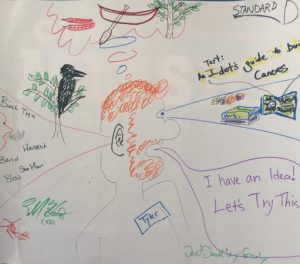A culturally-responsive curriculum fosters a complementary relationship across knowledge derived from diverse knowledge systems.
 (Our poster of multi-knowledge systems converging to create a canoe)
(Our poster of multi-knowledge systems converging to create a canoe)
Our group focused on the combination of information being gathered from the oral tradition and from books. This standard translates quite well to a language arts/English class. Some the earliest stories/myths/biblical tales were passed down orally before being written down as text. Many of the great Raven stories have also been translated to the story book form. Raven stories have been written into plays then performed in many different productions in the theater making a full circle of oral tradition to text and back to a new form of oral story-telling.
It is pretty fascinating to realize how much information (crucial information) was passed down orally for thousands of years. Most of that tradition is nearly gone, and we are at key moment in time where languages are fighting for their survival. Some but not all can be preserved and passed down for future used through the main sources of media to record Elders. The next generation is stepping forward to safe guard their language like our cohort David Sheakley by learning to speak and teach Ling’it. I hope to bring what I can into the class room and encourage student to learn as much of the Ling’it language or any language for that matter that is vulnerable. It will be great to bring these standards to the classroom.

Tyler, I am incredibly happy that you mentioned using oral traditions, I have always loved this unique aspect of stories, especially when used in the native tongue. I really enjoyed also you mentioning bringing in an elder or native speaker of the language, to help your lesson and to also encourage your students to learn the language as well. People tend to forget how unique and amazing of a place we live in with all that is around us. I am definitely a fan of what you are doing here and I plan to implement the same ideas.
Thanks for sharing, Tyler. I think the cultural difference between oral traditions and scribed traditions is important to teach students, as personally I have seen oral traditions be perceived as “primitive” or “backwards.” I also appreciated your hopes to encourage the learning of Lingit and other vulnerable languages for your students. I am thinking about how many of us are guests to this Lingit land, yet we do not know or desire to learn how to speak the language of the land. If we were to teach at a high school in France, would we not at least attempt to learn the basics of French before teaching?